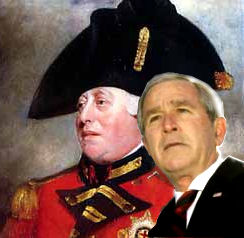Rove SubpoenaedThe House Judiciary Committee subpoenaed Karl Rove this past Monday to testify about these alleged political prosecutions. The people Rove allegedly talked to or gave orders to were in the Department of Justice and in the various US Attorney offices as well as individuals not in government. Rove, through his attorney, has publicly denied discussing this with anyone, including anyone at the White House.
Yet he invokes Executive Privilege in order to not appear in front of Congress.
Why?
If Rove had no discussions with the President about this – as his attorney has publicly claimed – then how does Executive Privilege apply? And EVEN if Rove had discussed these alleged illegal activities with the President – he must still honor a Congressional subpoena, even if he then invokes privilege during the hearing. Either the President knew – [In which case Howard Baker’s now famous question still applies] – or there is no Executive Privilege. Rove cannot have it both ways. In any case, how does what Rove can and cannot answer have anything to do with showing up?
Moreover, Executive Privilege ONLY applies to giving advice to the President or conversations with the President. It does NOT apply to conversations with people outside of the White House or outside of government..
 That’s it! The thought I’ve been trying to have. What does Executive Privilege have to do with Karl Rove’s wheelings and dealings with the DoJ? Unless Bush and Rove were in cahoots in that scheme, Executive Privilege is immaterial [If they were in cahoots, then there’s another tsunami in the wings]. If Rahm Emmanuel gets drunk and runs down a pedestrian, his proximity to the President doesn’t protect him from a charge of vehicular homicide. If Rahm Emmanuel works with Rod Blagojevich to retake the Illinois Governorship by palace intrigue, he’s going to be charged with conspiracy. Larisa has hit the nail squarely. The entire claim of Executive Privilege [by proxy] is spurious. And as she points out, if there is an instance of Rove talking to the President, he can evoke Privilege for those times only.
That’s it! The thought I’ve been trying to have. What does Executive Privilege have to do with Karl Rove’s wheelings and dealings with the DoJ? Unless Bush and Rove were in cahoots in that scheme, Executive Privilege is immaterial [If they were in cahoots, then there’s another tsunami in the wings]. If Rahm Emmanuel gets drunk and runs down a pedestrian, his proximity to the President doesn’t protect him from a charge of vehicular homicide. If Rahm Emmanuel works with Rod Blagojevich to retake the Illinois Governorship by palace intrigue, he’s going to be charged with conspiracy. Larisa has hit the nail squarely. The entire claim of Executive Privilege [by proxy] is spurious. And as she points out, if there is an instance of Rove talking to the President, he can evoke Privilege for those times only.
So Here We Are NowKarl Rove is alleged to have used the US Department of Justice as his own political brown-shirts… Innocent people went to jail, were denied their freedom, their rights, and even now are being denied justice. The victims of these illegal activities, including Don Siegelman, Paul Minor, Oliver E. Diaz Jr., John Whitfield, Wes Teel, Georgia Thompson, and others were in most cases financially destroyed and their careers ruined. The stress from this onslaught in most cases permanently affected the health of these victims and in two cases, has denied them the right to tend to a seriously ill spouse. In Paul Minor’s case, his wife of 40 years is dying from breast cancer that has spread to her brain.
She cannot see her husband because she cannot travel as she is in hospice. He cannot see his wife, because he is in prison. They will likely never see each other again. In Wes Teel’s case, his wife has Multiple Sclerosis and has to live through the daily horrors of this illness alone. Do these people, American citizens – whose only crime was that they were allegedly targeted as political enemies by Karl Rove – get any justice?
 The arguments for Executive Privilege are obvious. Congress and the White House are at odften at odds. Our Founders were well aware of that. Human Nature was as big a force in our Constitution in the late 18th Century as it is now. So Executive Privilege, a holdover from the rights of Monarchs, was added as a safeguard against abuse of yet another safeguard – Separation of Powers. That intent is clear. Congress cannot subpoena the President or his aides to grill them about matters where there is conflict between Congress and the White House. But there was never any intent to allow the President to obstruct justice.
The arguments for Executive Privilege are obvious. Congress and the White House are at odften at odds. Our Founders were well aware of that. Human Nature was as big a force in our Constitution in the late 18th Century as it is now. So Executive Privilege, a holdover from the rights of Monarchs, was added as a safeguard against abuse of yet another safeguard – Separation of Powers. That intent is clear. Congress cannot subpoena the President or his aides to grill them about matters where there is conflict between Congress and the White House. But there was never any intent to allow the President to obstruct justice.
The expansive presidential powers claimed and exercised by the Bush-Cheney White House are now an immutable part of American History – not contraversies, but facts. The importance of such precedents is difficult to overstate. As Supreme Court justice Robert Jackson once warned, any new claim of executive power, once validated into precedent, "lies about like a loaded weapon ready for the hand of any authority that can bring forward a plausible claim of an urgent need. Every repetition imbeds that principle more deeply in our law and thinking and expands it to new purpose."
Sooner or later, there will always be another urgent need.
 The claims of the Bush-Cheney White House were clear. They felt that the Presidency had been weakened in the aftermath of Nixon and Watergate, a claim Cheney authored even when he was in Congress in his Minority rebuttal in the Iran-Contra Report. Their claims of Presidential power have a theory [The Unitary Executive] and a history [read any newspaper]. So, as Savage argues, the Bush-Cheney precedents must be resolved now before they become canonized in the Law. If Karl Rove did any piece of what is alleged in these charges Congress is looking into, he is a punishable criminal being protected by a President. While we all assume he’s guilty, Rove deserves his day in court [may he get there sooner, rather than later].
The claims of the Bush-Cheney White House were clear. They felt that the Presidency had been weakened in the aftermath of Nixon and Watergate, a claim Cheney authored even when he was in Congress in his Minority rebuttal in the Iran-Contra Report. Their claims of Presidential power have a theory [The Unitary Executive] and a history [read any newspaper]. So, as Savage argues, the Bush-Cheney precedents must be resolved now before they become canonized in the Law. If Karl Rove did any piece of what is alleged in these charges Congress is looking into, he is a punishable criminal being protected by a President. While we all assume he’s guilty, Rove deserves his day in court [may he get there sooner, rather than later].I don’t think getting Rove to testify in a Congressional Hearing is going to clarify what happened. Like my childhood attempts to catch minnows at the edge of the lake, he’s very slippery. I think it will be another Yoo/Addington Hearing – very unsatisfying. I think he should be charged by the Department of Justice and investigated by a Special Prisecutor and a Grand Jury. But I do think that the fight to get him into that Hearing is important. This is a good issue to challenge these claims – Executive Privilege and Absolute Immunity. Why? Because, as Larisa points out, the claim is patently absurd.
There is another point in all of this that nags at me. The hardest question of all to ever answer is about one’s own motivations. How can I, as someone who knows that I believe that Karl Rove is part of a very dark spot on our history, evaluate my opinions about what should be done now. I am, by definition, a flawed observer. How can I, as someone who has almost uniformly disagreed with every policy of the Bush/Cheney Administration, be objective when it comes to evaluating them. They would discount what I think by saying, "Oh, you’re just a Liberal!" It’s a accurate charge, but I would argue with their conclusion [even though I can hear myself saying in certain circumstances, "Oh, you’re just a Conservative!" or "Oh, you’re just a Republican!"].
One way to evaluate my own reactions would be to look at former reactions when similar things happened to Democrats. I decried LBJ’s abuse of power. I wanted Clinton to resign because he lied. I didn’t vote for him the second time [I just didn’t vote]. I was ready for Spitzer and Blagojevich to move on immediately. But self righteous examples don’t really clarify anything.
Sorry, the comment form is closed at this time.